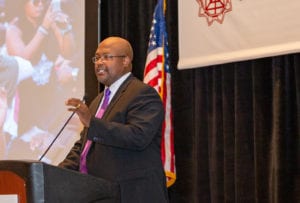Who is a member?
Our members are the local governments of Massachusetts and their elected and appointed leadership.

Leon Andrews Jr., director of the National League of Cities’ Race, Equity And Leadership (REAL) initiative, discusses how to turn intent into action while promoting racial equity and creating more inclusive communities during the Jan. 25 closing session of the MMA Annual Meeting & Trade Show in Boston.
The country must confront its past and work to repair the damage caused by centuries of systemic racism, the National League of Cities’ Leon Andrews Jr. told local officials at the Jan. 25 closing session of the MMA Annual Meeting in Boston. And this work, he said, is vital at the local level.
Andrews, who directs the NLC’s Race, Equity And Leadership (REAL) initiative, led a discussion with city and town leaders about promoting racial equity.
“Racial disparities exist in every important aspect of life,” he said. “We have the data, and the data tell us that race is still the strongest predictor of one’s success.
“If we know that,” he said, “[then] racial equity requires us to close the gap where race no longer predicts one’s success, while improving outcomes for everyone.”
He urged local leaders to engage residents in this effort and to have honest conversations about how public policies have consistently disadvantaged people of color.
“This is not just the moral thing to do, or the right thing to do – it’s good governance,” Andrews said. “Doing this work as local leaders helps your communities be safer, healthier, prosperous and more accountable.”
Andrews said the NLC created REAL after the 2014 fatal shooting of a black teenager, Michael Brown, in Ferguson, Missouri, and the unrest that followed. When Ferguson, an NLC member, asked for help, the NLC realized it didn’t have a good answer, and wasn’t prepared for the extent of racial tension in the country, Andrews said.
The NLC started REAL to provide training and technical assistance to help communities eliminate racial disparities, heal racial tensions and build more equitable communities, Andrews said. REAL now works with more than 1,200 municipalities.
Andrews warned officials not to conflate the concepts of equality and equity. Equality means treating everyone the same, he said, regardless of situation. Equity involves justice, acknowledges that people don’t start on level playing fields, and looks at what people need to benefit fairly from policies and programs.
Andrews pointed to racial disparities in areas such as infant mortality rates, maternal childbirth deaths, childhood obesity and life expectancy as problems needing equitable solutions.
He identified steps officials can take to address institutional and structural racism, including creating a racial equity plan, leading by example, listening to residents, making public declarations about equity, and committing to policy change.
Communities pursuing equity acknowledge that policies might not directly invoke race or ethnicity, but can hurt communities of color in areas such as housing, employment, criminal justice, and healthcare, Andrews said.
“Your work is to look at policies that have that disproportionate impact, without it saying that explicitly in the policy,” Andrews said.
In Arlington, REAL has been helping leaders create a more inclusive community. Andrews recently conducted a four-hour Select Board training, and a day-long staff training. Town Manager Adam Chapdelaine, who joined Andrews onstage for part of the discussion, said REAL will make several more visits to his town this year.
“Frankly, I was very moved about the urgency of the work and the need for people on the local, state and federal level to learn about these issues and find the right ways to operationalize and organize,” said Chapdelaine, the MMA’s new vice president.
But as Chapdelaine became more involved with REAL a few years back, Arlington faced racial tensions when a police lieutenant’s controversial writings became public, forcing the town to reconsider its climate. While Arlington is about 80 percent white, Chapdelaine said its leaders want everyone – including Asian, African-American, Latino and other minority residents – to feel included.
“We do have diversity, and we need to understand better how to engage these populations in our community,” Chapdelaine said.
Brookline Select Board Member Raul Fernandez asked about policies a municipality can legally pursue to address racial injustice. Andrews responded with the example of using tax revenue from marijuana sales to fund equity programs.
“Brookline just passed that, actually,” Fernandez said. “So a third of revenue from marijuana is actually going to racial equity advancement, economic advancement, closing the opportunity gap.”
North Adams City Councillor Lisa Blackmer, president of the Massachusetts Municipal Councillors’ Association, criticized local zoning rules that require large lot sizes and frontage. She said she has long held that such policies are elitist, but now she also understands that they have racial implications.
“I think we need to start talking to select boards, and planning boards, about their land-use policies and the impact they have on implicit bias,” Blackmer said.
For more about REAL’s work, refer to links on the MMA’s mobile app (in the Closing Session and Awards Presentation section), or visit www.nlc.org/program-initiative/race-equity-and-leadership-real.